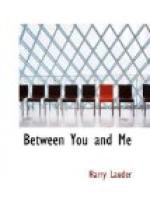We felt the same way. But I learned a lesson then that has always made me cautious in criticizing the capitalist who sits back and rakes in the siller while others do the work. The man has his uses, I’m tellin’ ye. I found it oot then; they’re findin’ it oot in Russia now, since the Bolsheviki have been so busy. I’m that when the world’s gone along for so many years, and worked out a way of doing things, there must be some good in it. I’m not sayin’ all’s richt and perfect in this world —and, between you and me, would it be muckle fun to live in it if it were? But there’s something reasonable and something good about anything that’s grown up to be an institution, even if it needs changing and reforming frae time to time. Or so I think.
Weel, e’en though I could see, noo, the reason for Munro to be gettin’ his big share o’ the siller Mac and I made, I was no minded not to ha’ another try for it myself. Next season Mac and I made our plans even more carefully. We went to most of the same towns where business had been bad before, and this time it was good. And I learned something a manager could ha’ told me, had he liked. Often and often it’s necessary to tak’ a loss on an artist’s first tour that’ll be more than made up for later. Some folk go to hear him, or see him, even that first time. An’ they tell ithers what they’ve missed. It was so wi’ us when we tried again. Our best audiences and our biggest success came where we’d been most disappointed the time before. This tour was a grand success, and once more, for less than three months of work, Mac and I banked more than a hundred pounds apiece.
But there was more than siller to count in the profits of the tours Mac and I made together. He became and has always remained one of my best and dearest friends—man never had a better. And a jollier companion I can never hope to find. We always lived together; it was easier and cheaper, too, for us to share lodgings. And we liked to walk together for exercise, and to tak’ our amusement as well as our work in common.
I loved to hear Mac practice. He was a true artist and a real musician, and when he played for the sheer love of playing he was even better, I always thought, than when he was thinking of his audience, though he always gave an audience his best. It was just, I think, that when there was only me to hear him he knew he could depend upon a sympathetic listener, and he had not to worry aboot the effect his playing was to have.
We were like a pair of boys on a holiday when we went touring together in those days, Mac and I. We were always playing jokes on one another, or on any other victims we could find usually on one another because there was always something one of us wanted to get even for. But the commonest trick was one of mine. Mac and I would come down to breakfast, say, at a hotel, and when everyone was seated I’d start, in a very low voice, to sing. Rather, I didn’t really sing, I said, in a low, rhythmical tone, with a sort of half tune to it, this old verse:




